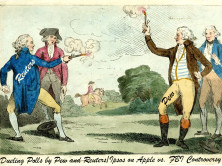
Detroit Free Press editors recently admitted to the Wall Street Journal that they took an editorial suggestion from an advertiser.
According to the Wall Street Journal, Sunday Nov 1, the Detroit Free Press published a series of stories about the Medicare open enrollment period. The timing is right for such coverage, with health bills being debated in congress.
But it wasn’t national climate that inspired the Free Press to publish this series, the WSJ writes, it was their advertiser, health insurer Humana Inc.
As circulation figures drop along with ad revenue, news media and advertisers are now engaged in a delicate dance, trying to build new relationships bringing publishers the money they require and advertisers the exposure they may have lost in the growth of online media. These relationships become a problem when they blur the line between news and advertising–a line the Detroit Free Press seems to have danced right over in this case.
Jennifer Lush reports at editorseweblog.org on the WSJ article revealing the relationship. Lush says that Free Press editors have defended themselves, saying “whilst Humana had suggested the story, the advertiser had no further involvement with its writing and that the only reason the paper followed through with the story to begin with, was because the issue was ‘topical and relevant to readers’”.
In essence, the editors argue that Humana’s suggestion was kind of like a tip off–they wouldn’t have decided to do the stories if there weren’t a separate independent reason in addition to Humana’s idea. The implication here, is that Humana had no influence over the coverage. But for that to be true, there would have to be evidence that the Free Press would have definitely commissioned and printed these stories regardless of Humana’s tip-off and of their advertising.
The problem is, we don’t know if the Free Press would have decided to run this series on its own. Yes, the timing makes sense, but without a time machine to go back and see what would have happened, there is no way to be sure. The fact is, Humana suggested the story and the Free Press wrote it. Regardless of whether the insurance company had any power over the content of the pieces, they did have an impact on the choice to cover the issue in the first place. They affected the direction of news coverage in the paper.
Perhaps this is more of a toe-over-the line, than a foot, or a leg or some such. More egregious examples exist of blending news and advertising, or allowing advertisers undue influence, like the recent controversy StinkyJournalism covered this summer over the Washington Post “Salons”.
Lush reports that “George Janson [managing partner and director of print for GroupM] told WSJ that by ‘accepting editorial input from an advertiser, the Free Press risks raising questions about its editorial independence, one of the attributes that distinguish newspapers from other news outlets in the minds of many readers.’”
This is the crux of the issue. Of course it is possible that no harm was done in this specific case–that the Free Press reported the stories fairly and accurately regardless of the push from Humana. But crossing the line and allowing an advertiser to suggest news coverage raises questions about a paper’s independence. Editorial independence is the absolute cornerstone of trust between a news source and it’s audience. And while it isn’t clear that the Free Press is definitely lacking independence, neither is it clear now that they definitely possess it.







Comments Terms and Conditions